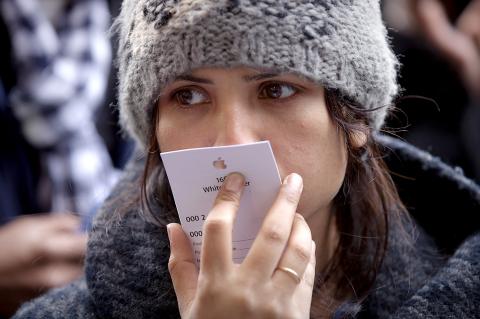Apple Inc’s operating system upgrade for old iPhone users will not affect purchases of the iPhone 5 when it hits stores in Taiwan, local telecoms operators said on Thursday.
Apple opened free downloads of its iOS 6 worldwide on Wednesday, allowing current iPhone and iPad users to upgrade through their devices directly or via iTunes software on computers.
On Internet forums in Taiwan, a number of iPhone users raved about the 200-plus new features of iOS 6, but there were also complaints, including about the new Maps app, with some saying they got lost because it did not give accurate directions.

Photo: Bloomberg
COMING IN NOVEMBER
Although Taiwanese consumers are rushing to upgrade their iPhones, the top three local carriers said they were not worried that the iOS upgrade would have a substantial impact on the sales of the iPhone 5, which is expected to be released locally in November.
“Apple has been offering system upgrades for years. It’s not news for Apple product users,” said Hu Hsueh-hai (胡學海), a marketing managing director at Chunghwa Telecom Co (中華電信), the country’s largest mobile provider.
“The iOS 6 upgrade and sales of the iPhone 5 should be viewed as independent issues, and we don’t think the upgrade will delay buying of the new iPhone,” he said in a telephone interview.
Josephine Juan (阮淑祥), a spokeswoman for Taiwan Mobile Co (台灣大哥大), the country’s No. 2 carrier, said she did not see any delayed purchases of the iPhone 4S last year when Apple opened upgrades to iOS 5.
Sales of the iPhone 4S were going well at that time and Taiwan Mobile was unaffected by the iOS 5 upgrade, Juan said, adding that smartphone buyers usually took both form factors and software features into account.
Alison Kao (高治華), a spokeswoman for Far EasTone Telecommunications Co (遠傳電信), the nation’s third-biggest mobile service provider, said consumers were unlikely to delay buying new phones simply because they could upgrade the operating system on old models.
ATTRACTIVE DESIGN
If two phone models with similar functions are offered to Taiwanese consumers, they will usually choose to buy the one with a more attractive body design, Kao said.
Apple’s iPhone 5, unveiled in the US on Sept. 12 with iOS 6, is taller, thinner, lighter and faster than the previous iPhone 4S.
The iPhone 5 went on sale in nine countries yesterday. It will be available in 20 other countries on Friday next week and will reach 100 countries by the end of the year, in the company’s fastest product rollout ever.
According to Apple, pre-orders for the iPhone 5 topped 2 million in the first 24 hours, more than double the previous record of 1 million held by the iPhone 4S.

The DBS Foundation yesterday announced the launch of two flagship programs, “Silver Motion” and “Happier Caregiver, Healthier Seniors,” in partnership with CCILU Ltd, Hondao Senior Citizens’ Welfare Foundation and the Garden of Hope Foundation to help Taiwan face the challenges of a rapidly aging population. The foundation said it would invest S$4.91 million (US$3.8 million) over three years to foster inclusion and resilience in an aging society. “Aging may bring challenges, but it also brings opportunities. With many Asian markets rapidly becoming super-aged, the DBS Foundation is working with a regional ecosystem of like-minded partners across the private, public and people sectors

BREAKTHROUGH TECH: Powertech expects its fan-out PLP system to become mainstream, saying it can offer three-times greater production throughput Chip packaging service provider Powertech Technology Inc (力成科技) plans to more than double its capital expenditures next year to more than NT$40 billion (US$1.31 billion) as demand for its new panel-level packaging (PLP) technology, primarily used in chips for artificial intelligence (AI) applications, has greatly exceeded what it can supply. A significant portion of the budget, about US$1 billion, would be earmarked for fan-out PLP technology, Powertech told investors yesterday. Its heavy investment in fan-out PLP technology over the past 10 years is expected to bear fruit in 2027 after the technology enters volume production, it said, adding that the tech would

YEAR-END BOOST: The holiday shopping season in the US and Europe, combined with rising demand for AI applications, is expected to drive exports to a new high, the NDC said Taiwan’s business climate monitor improved last month, transitioning from steady growth for the first time in five months, as robust global demand for artificial intelligence (AI) products and new iPhone shipments boosted exports and corporate sales, the National Development Council (NDC) said yesterday. The council uses a five-color system to measure the nation’s economic state, with “green” indicating steady growth, “red” suggesting a boom and “blue” reflecting a recession. “Yellow-red” and “yellow-blue” suggest a transition to a stronger or weaker condition. The total score of the monitor’s composite index rose to 35 points from a revised 31 in August, ending a four-month

Taiwan Semiconductor Manufacturing Co (TSMC, 台積電) has secured three construction permits for its plan to build a state-of-the-art A14 wafer fab in Taichung, and is likely to start construction soon, the Central Taiwan Science Park Bureau said yesterday. Speaking with CNA, Wang Chun-chieh (王俊傑), deputy director general of the science park bureau, said the world’s largest contract chipmaker has received three construction permits — one to build a fab to roll out sophisticated chips, another to build a central utility plant to provide water and electricity for the facility and the other to build three office buildings. With the three permits, TSMC